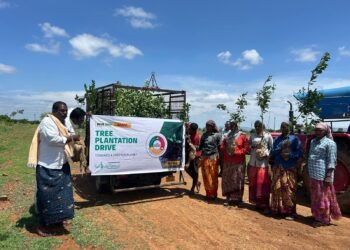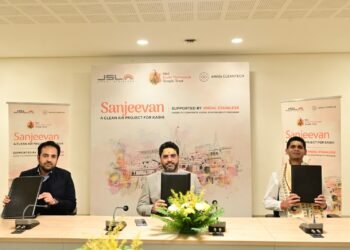India’s largest bank system, State Bank of India (SBI) has released its Sustainability Report for the year 2019-20. This sustainability report, titled ‘Responsible Finance – Sustainable Growth’, comprehensively captures Bank’s vision of contributing to a sustainably growing economy and practicing responsible finance. This is the fifth consecutive report.
Here are 15 key Points of SBI Sustainability Report:
1. Car Loan and Auto Loan
Contemporary lifestyles across the nation have spurred a growing interest in vehicle ownership and SBI’s Car Loan product aims to facilitate retail owners in realising this aspiration. The product has evolved over time to enhance ease of use for customers as well as promote sustainable impacts. SBI has taken a dynamic approach to this product, and is constantly optimising it to meet customers’ needs. Most notably, women borrowers can avail a further concession in interest rates, as can users of the Bank’s flagship digital platform, YONO. In a bid to promote cleaner mobility, the Bank’s Green Car Loan scheme comes with a longer repayment period of up to eight years, with a concession of 20 basis points (bps) on the interest rate, compared to a regular car loan.
Through the provision of auto loans at competitive rates, SBI is helping its customers realise their dreams of owning a personal vehicle. A wide product range that covers all types of vehicles is offered through various channels. This has been instrumental in the growth of the Bank’s auto loan offerings, even in the backdrop of declining industry sales. This year, the Bank’s auto loan portfolio reached Rs. 72,662 crore, up from Rs. 71,884 crore on 31st March 2019. SBI’s market share in the auto loan segment is over 30% amongst all scheduled commercial banks.
2. Home Loan
Access to good-quality, affordable housing is integral to leading a happy, healthy life. SBI endeavours to help people achieve this dream through its Home Loan product, with special emphasis on affordable housing loans, which made up 62.30% of its total home loan portfolio this year. The Bank is also leveraging digitisation to process applications and assess eligibility in real-time. Additionally, it is providing a 5 bps concession to women to make housing accessible to the masses.
3. SBI E-Rickshaw
E-Rickshaws are an environment-friendly and cost-effective mode of transport, which can be invaluable in reducing air and noise pollution. They also provide last-mile connectivity in areas that are not easily accessible by public transport. This, combined with their potential to generate large-scale employment for unskilled and semi-skilled workers, not only contributes to progress towards the SDGs but also presents a wealth of opportunity for the Bank.
4. Healthcare Business Loan
By giving healthcare providers access to the funding they need to set up, expand or modernise their practices, SBI hopes to elevate the quality of diagnosis and treatment in the country. This financing will also provide access to better care to residents of smaller cities and villages, resulting in reduced burden on existing facilities and consequently, better healthcare for all.
5. Grid-Connected Rooftop Solar PV Projects
Aimed at financing small projects with a capacity of up to 1MW, this initiative seeks to popularise the use of renewable energy in commercial institutions and industry buildings with smaller roofs. This product is helping institutions reduce their spend on electricity, providing further incentive to switch to solar energy.
6. Financing Polyhouse
Polyhouse farming is a modern technique in which micro-climate is regulated to enhance yields. This plays a direct part in reducing food scarcity, and improving the nutritive value of the produce, while also helping overcome limitations caused by resource availability. The Bank is financing these projects to work towards the goals of zero hunger, good health and well-being, sustainable consumption and production, and climate action.
7. Financing Solar Photovoltaic Pump Sets
Solar water pumping systems are a sustainable, durable, cost-effective and easy-to-use alternative to conventional diesel and electric pumps. They are especially invaluable for farmers in areas where electricity is unreliable or unavailable. By providing funding for their purchase, SBI aims to ensure a sustainable livelihood for these farmers at a fraction of the environmental impact.
8. SHG Financing
The Bank’s self-help group linkage provides financial products and services to those who lack access to formal banking. SBI aims to empower these groups by providing them with the funds they need to enhance their skills and generate sustainable livelihoods. Preference is given to women SHGs to promote gender equality, and the groups’ linkage with NGOs further contributes towards capacity-building.
9. Personal Loans
Personal loans, both secured and unsecured, form an important part of SBI’s portfolio. The Bank, which is a leader in this market segment, is catering to the needs of salaried customers through products like SBI Quick Personal Loans and Xpress Credit. In FY 2019-20, SBI extended personal loans worth Rs 90,000 crore to over 20 lakh customers, bringing its personal loan portfolio to Rs. 1,96,189 crore. In addition to the Bank’s branches and its website, the Bank also extends personal loans through its digital platform, YONO. It is the fastest-growing channel for the disbursal of personal loans, having crossed a milestone of Rs 1,00,000 crore. YONO also enables an easy-to use 4-click paperless process. Using this feature, Rs. 9,694 crore of personal loans were disbursed in the current reporting period.
10. Educational Loans
SBI recognises that access to high-quality education is key to the development of human capital and consequently, the economy. The Bank having a market share of 34.72% as on 31st March 2020, up from 30.55% at the end of FY 2018-19. This year, the State Bank of India has helped 76,572 meritorious students realise their dreams by providing financial assistance to the tune of Rs. 8,777 crore. 38% of these loans were extended to girls, marking an increase of 3% from the last reporting period. In line with its commitment to SDG 5 (Gender equality), the Bank is providing these loans for female students at a concessional rate of interest.
To broaden the scope of its education loans and enhance customer experience, the Bank has included a large number of premier and reputed institutions under the Scholar Loan scheme, which provides education loans with relaxed norms at concessional rates. Furthermore, SBI has improved the reach of the ‘Global Ed-vantage Scheme’, which supports overseas study by extending doorstep services in select cities.
11. Real Estate and Housing Loans
SBI is India’s largest home loan provider, a feat that was acknowledged at the ‘FE India’s Best Banks Awards 2019’. In FY 2019-20, the Bank served a sizeable share of the market, and had a portfolio amounting to Rs. 4,55,865 crore. The push for economical housing has led to an increase in the number of people seeking affordable housing loans. The affordable housing segment now accounts for 62.30% of SBI’s total home loan portfolio, whereas Priority Sector Lending stands at 35.03%.
12. Agriculture Finance
Agriculture and its allied industries form the backbone of the Indian economy. SBI recognises the importance of providing credit support to the industry, which is powering the growth of the nation. To this end, the Bank is serving more than 1.42 crore farmers by providing credit support for activities like dairy, poultry and fisheries, which facilitate daily cash flow for farmers. This year, the Bank surpassed its target of Rs. 1.28 lakh crore for ground-level credit disbursement to farmers by 38.7%, clocking in at Rs. 1.77 lakh crore.
13. Domestic Deposits
The value of domestic deposits saw a year-onyear growth of 11.03% amounting to Rs. 31,24,616 crore as on 31st March 2020. The domestic savings bank deposit recorded an annual growth of 9.99%, bringing the portfolio to Rs. 11,93,566 crore. The term deposit portfolio, meanwhile, amounted to Rs. 17,13,635 crore, registering a growth of 12.23% from FY 2018-19.
14. NRI Business
SBI caters to approximately 37 lakh Non-Resident Indian (NRI) customers through a network of 83 dedicated NRI branches in India. It also has foreign offices in 32 countries, 227 global banks as correspondent banks, and tie-ups with 56 exchange houses and six banks to facilitate remittances. The Bank is a leader in the NRI banking space, with a market share of over 22% and an NRI deposit base that stands at Rs. 2,17,675 crore.
15. Advancing the Agri Business
In July 2019, SBI launched the YONO Krishi app to strengthen its Agri business. The platform has three key propositions – Agri Gold Loan, a knowledge and advisory hub called Mitra, and Mandi, an online marketplace for farm inputs. The application is available in 11 regional languages, in addition to English, and has products such as Kisan Credit Card (KCC) Application, KCC Renewal and Pre-Approved Agricultural Loans in the pipeline. Since its launch, over 4.78 lakh Agri Gold loans amounting to over Rs. 5,944 crore have been sanctioned through YONO Krishi. The application’s Mandi and Mitra portals have also garnered interest, registering more than 12,000 clicks everyday.
(Source: SBI Sustainability Report 2019-20)






















